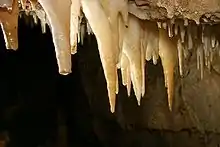stalactite
English
Etymology

A group of stalactites in Brazil.
From New Latin stalactites, from Ancient Greek σταλακτός (stalaktós, “dripping; dropping”) + Latin -ītēs (suffix with the sense ‘belonging to’ forming adjectives) (modelled after the names of stones ending in -ites). Σταλακτός (Stalaktós) is derived from σταλάσσειν (stalássein, “to drip; to let (something) drip”) + -τός (-tós, suffix forming adjectives denoting possibility from verbs).[1][2]
Pronunciation
- (Received Pronunciation) IPA(key): /ˈstælæktaɪt/, /-lək-/, /stəˈlæktaɪt/
Audio (Southern England) (file) - (General American) IPA(key): /stəˈlækˌtaɪt/, /ˈstæləkˌtaɪt/
- Hyphenation: sta‧lac‧tite
Noun
stalactite (plural stalactites)
- (geology) A secondary mineral deposit of calcium carbonate or another mineral, in shapes similar to icicles, that hangs from the roof of a cave.
- Coordinate term: stalagmite
- 1876, Mark Twain [pseudonym; Samuel Langhorne Clemens], chapter XXXIII, in The Adventures of Tom Sawyer, Hartford, Conn.: The American Publishing Company, →OCLC:
- In one place, near at hand, a stalagmite had been slowly growing up from the ground for ages, builded by the water-drip from a stalactite overhead.
Derived terms
Related terms
Translations
mineral deposit hanging from the roof of a cave
|
References
- Compare “stalactites, n.”, in OED Online
 , Oxford, Oxfordshire: Oxford University Press, July 2023.
, Oxford, Oxfordshire: Oxford University Press, July 2023. - “stalactite, n.”, in Dictionary.com Unabridged, Dictionary.com, LLC, 1995–present.
Further reading
 stalactite on Wikipedia.Wikipedia
stalactite on Wikipedia.Wikipedia
French

des stalactites
Etymology
Borrowed from New Latin stalactites, from Ancient Greek σταλακτός (stalaktós).
Pronunciation
- IPA(key): /sta.lak.tit/
Audio (file)
Further reading
- “stalactite”, in Trésor de la langue française informatisé [Digitized Treasury of the French Language], 2012.
This article is issued from Wiktionary. The text is licensed under Creative Commons - Attribution - Sharealike. Additional terms may apply for the media files.